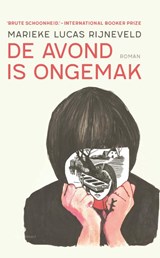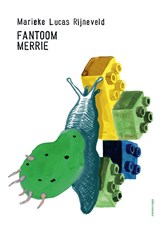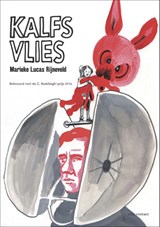Translating Marieke Lucas Rijneveld’s The Discomfort of Evening, a side note on synonyms for shit
09 maart 2020Vondel Translation Prize winner Michele Hutchison translated Marieke Lucas Rijneveld’s De avond is ongemak as The Discomfort of Evening, which is now longlistedshortlisted for the International Booker Prize. For us, she elucidates some issues she encountered while translating: breaking up and matching, finding the right synonyms for shit – and a not too mature word for ‘poepgat’.
N.B. Previously on Athenaeum.nl: an excerpt from De avond is ongemak and a podcast of Rijneveld being interviewed about the book.
Sometimes when you’re translating you do something unconsciously or intuitively that you don’t notice until you return to your work to revise it. The revision stage means analysing all your choices and trying to sift out the poor ones, the misplaced ones and, quite crucially, the interference from the original language, plus all the non-native speakers around you if you live abroad.
When I started work on The Discomfort of Evening I did so slowly and laboriously, trying to feel my way through the dense poetry of the original. I was asked by AtlasContact to translate a sample for the book fair and my impression was that this had potential – it had a Dutch polder setting like Gerbrand Bakker’s The Twin [which David Colmer wrote about on Athenaeum.nl] and was equally melancholic. The rights were soon snapped up by Faber & Faber and I got asked to translate the novel on the basis of my sample, which they were wildly enthusiastic about.
Breaking up and matching
I figured out an approach for the way Rijneveld stacks up poetic images by taking apart each sentence and rebuilding it. This meant shifting the clauses and punctuation around to achieve what I felt was an English version of the text’s natural rhythm. This is the start of my translation. I’ve taken the liberty of breaking up the second line in the Dutch into two sentences in English but matched the alliteration of ‘kloven, eeltringen en bloemkoolachtige knobbeltjes’:
‘I was ten and stopped taking off my coat. That morning, Mum had covered us one by one in udder ointment to protect us from the cold. It came out of a yellow Bodega tin and was normally used to prevent the dairy cows’ teats from getting cracks, calluses and cauliflower-like lumps.’
Then about a third of my way into the translation I suffered a pulmonary embolism, followed by a strong reaction to the meds. My work was put on hold for several weeks while I lay around in a purple haze. Returning to it, I no longer had time for such slow laborious work as at the start. I picked up the thread and ran, working at a steady flow, channelling the voice of the young disturbed protagonist Jas as life on her family’s farm caved in.
Poo or poop
At proof stage, an American publisher came on board and wanted to make the text work on both sides of the Atlantic by compromising on some terms. Jas is severely constipated and there’s a recurrent faecal theme in the novel which includes a scene in which Jas’s father inserts green soap into her anus to induce defecation. Now here comes the issue: Brits say poo and Americans poop.
Like any translator my vocabulary and stylistic range is a product of my upbringing (middle class, UK Midlands) and age (late 40s) and I’d translated the faecal motifs in line with what I’d expect a naïve ten-year-old growing up in a strongly religious community to use. When the conversation with the American editor started, I decided to run a poll on Facebook and see what other native speakers thought.
I also realized I had a specialist among my colleagues – American Nancy Forest-Flier whose The Story of Shit (Middas Dekkers) was shortlisted for the Vondel prize. She didn’t have a compromise solution, alas – all of her poops had been turned into poos for the UK & Australian market. Yet parents of kids in the UK said their offspring were using words like poop and butt now, words that were definitely dismissed as ‘awfully American’ in my own childhood. British English is subject to globalisation and is changing more quickly than my own usage, which is stuck in time, or at least changing more slowly, due to my having lived abroad for the last fifteen years.
‘Poepgat’?
One of the most worrying issues was my translation of the Dutch word poepgat which means anus in English. I felt anus was much too clinical a term for a ten-year-old; there’s nothing childish about it. Butthole/arsehole/asshole all sounded way too mature to my mind. I left the harsher sounding words like arsehole to Jas’s father, a no-nonsense farmer, and translated it literally as ‘poo hole’. It was the place the poo came from – poo that was both longed for and withheld. It also retained the word hole. There is also recurrent theme in the text of holes, from the burrows made by moles, to holes in the cheese, holes dug in the ground, and holes in the body, metaphorical or otherwise. The holes symbolize loss.
Although I worried I was going to be subject to criticism that my translation was too literal, in the end I decided to stick with my intuitive and idiosyncratic translation. It was chosen from a sense of intimacy with the main character and her voice. But then (dramatic turn!) for the final print edition, the word got changed by committee again – to bum hole, neatly side-stepping the poo/poop issue. Jas had used bum elsewhere in the text, and this retained the word hole, even though just bum on its own might have been more logical.
I know other translators would have made different choices, in fact other translators are often our most feared readers. But translation is always a matter of interpretation. It’s like acting – which accent do you bring to a text? Which elements are you drawn to, and what gets emphasized consciously or not in your version? And all of this relates back to what I said about a translator’s range being a product of their upbringing and life experience. All translations are secondary to the original but no two translations are the same.
Michele Hutchison vertaalde werk van onder anderen Ilja Leonard Pfeijffer [read her text on translating La Superba], Esther Gerritsen, Sander Kollaard (Vondel Translation Prize 2020!), Tosca Menten, Tom Lanoye, Joris Luyendijk, Joris Luyendijk en Simone van der Vlugt.






